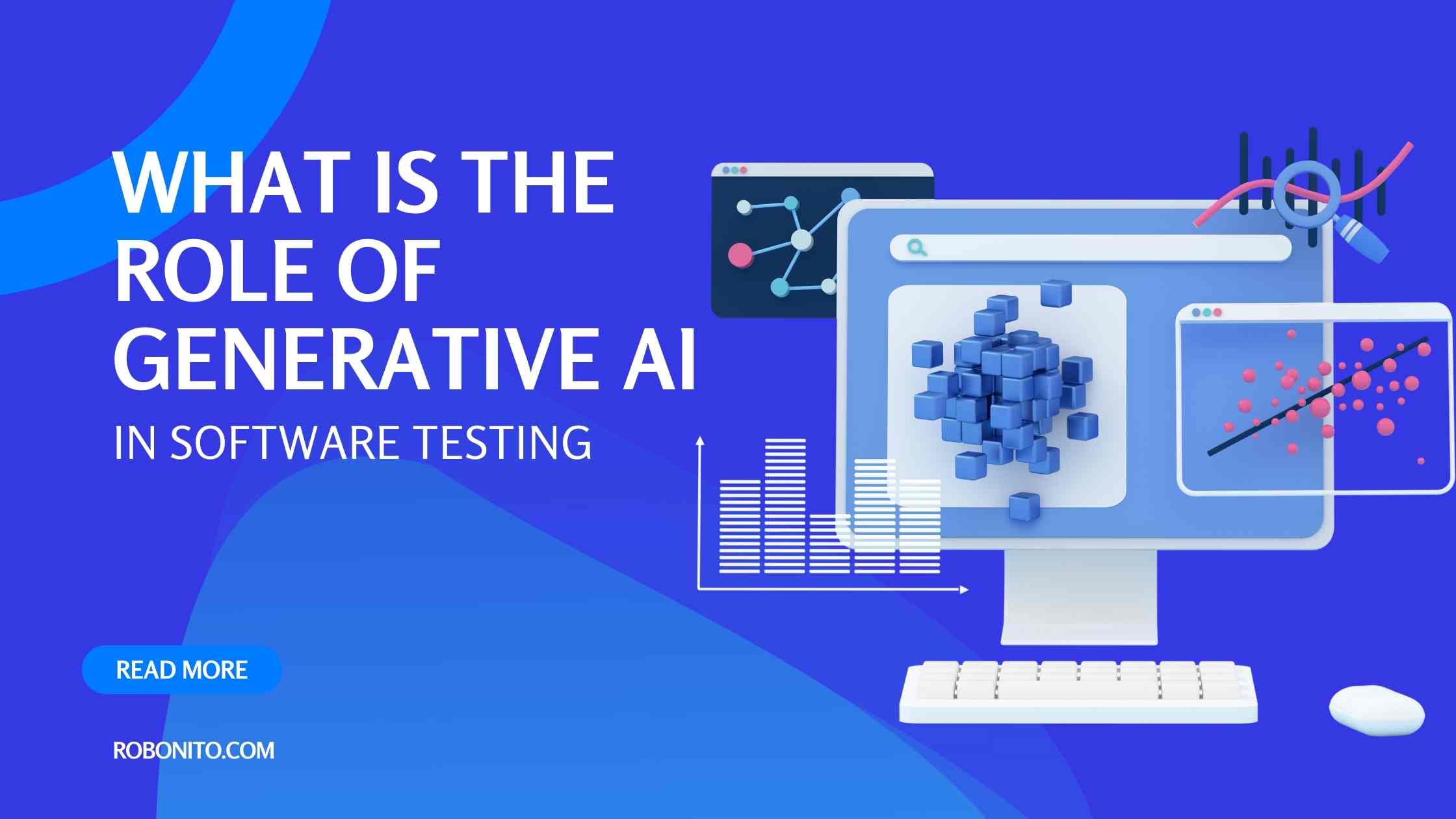This article explores the applications and benefits and the role of generative AI in software testing, highlighting its potential to enhance efficiency, accuracy, and effectiveness. Software testing plays a vital role in ensuring the quality and reliability of software applications. Traditionally, software testing has been a manual and time-consuming process, often prone to human error. However, with advancements in technology, the integration of generative AI in software testing has revolutionized the industry.
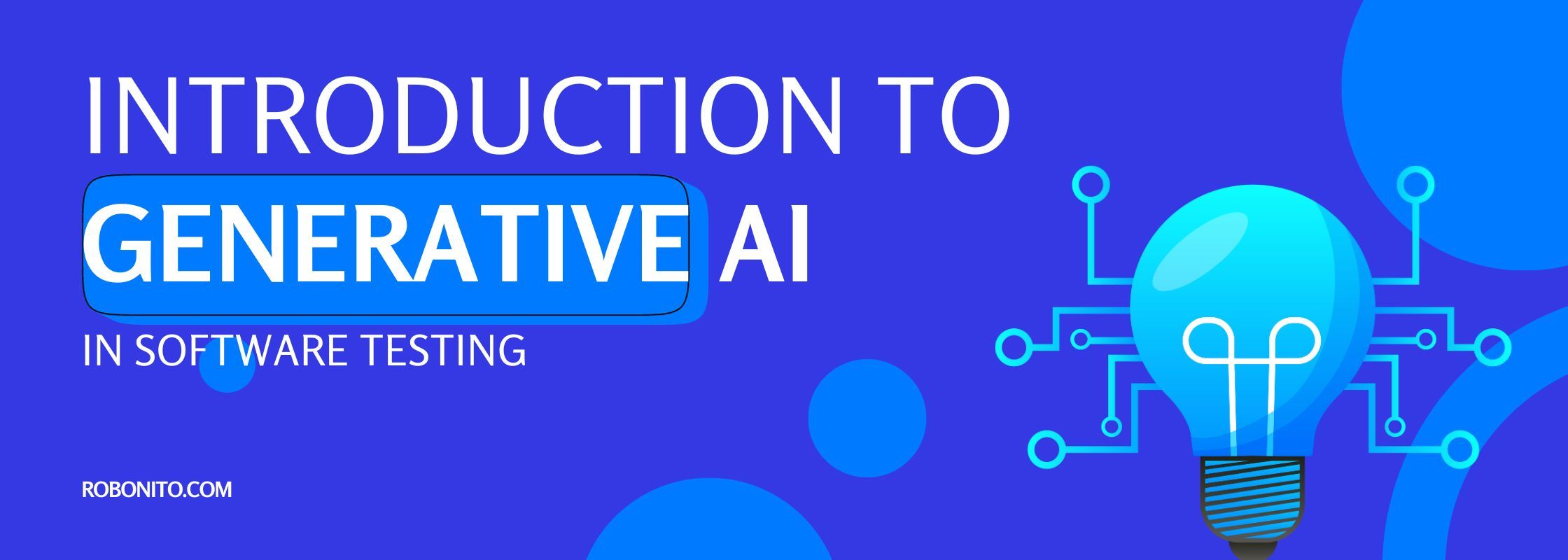
Generative AI, a subset of artificial intelligence, focuses on creating models capable of generating new content or performing tasks autonomously. In software testing, generative AI algorithms can analyze vast amounts of data, learn from patterns, and generate meaningful insights to improve the testing process. By simulating real-world scenarios, generative AI can help identify potential issues, optimize test cases, and enhance overall software quality.
Benefits of Generative AI in Software Testing
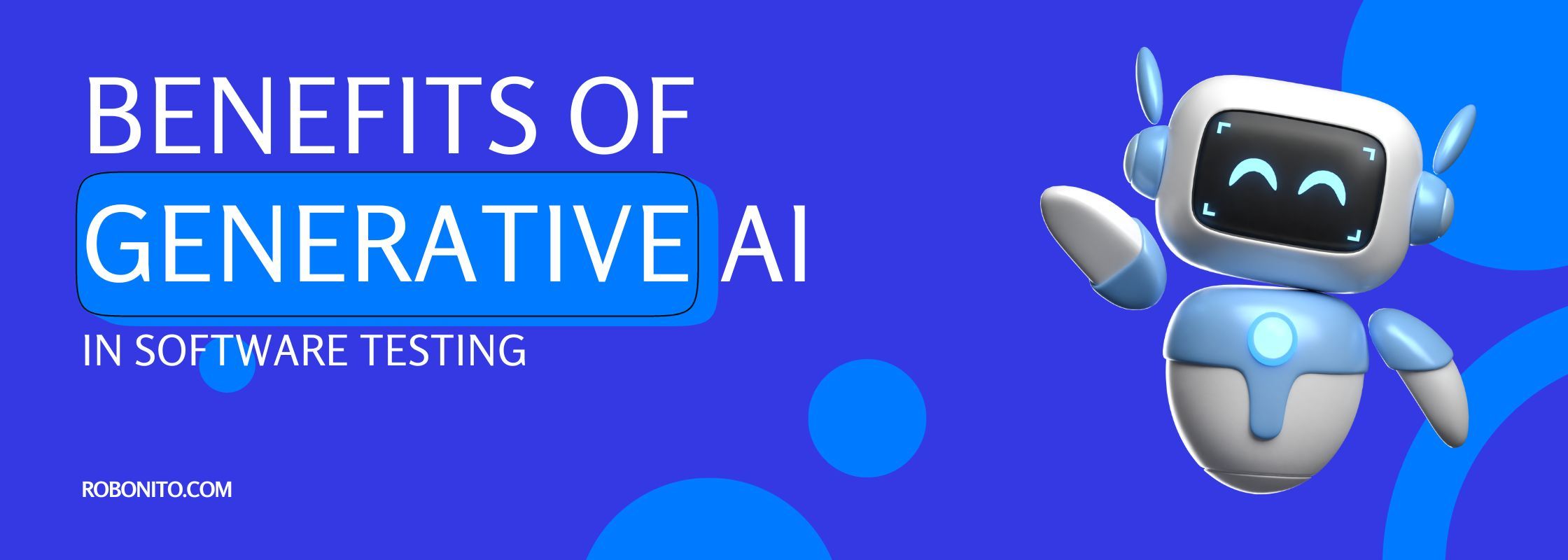
Generative AI brings numerous advantages to software testing, including:
1. Automated Test Case Generation
Generative AI algorithms can automatically generate diverse test cases based on predefined criteria. This automation reduces manual effort, speeds up the testing process, and ensures broader test coverage. It enables software testers to focus on more complex scenarios and critical areas, ultimately improving the efficiency of the testing phase.
2. Bug Detection and Fixing
Generative AI can detect and identify potential bugs and vulnerabilities in software applications. By analyzing code, log files, and historical data, generative AI algorithms can pinpoint problematic areas and provide actionable insights for bug fixing. This accelerates the debugging process, resulting in faster and more reliable software releases.
3. Test Data Generation
Generative AI can generate realistic and diverse test data sets, enabling thorough testing of software applications. By creating data that simulate real-world scenarios, generative AI helps uncover hidden issues and edge cases that may not be apparent with traditional testing approaches. This ensures better test coverage and improves the overall quality of the software.
4. Performance Testing and Optimization
Generative AI algorithms can simulate various load conditions and identify performance bottlenecks in software applications. By generating test scenarios that mimic real-world usage patterns, generative AI helps assess system performance, scalability, and responsiveness. It enables developers to optimize their code and infrastructure, resulting in more robust and high-performing software.
5. Security Testing
Generative AI can assist in detecting vulnerabilities and potential security breaches in software applications. By analyzing code, network traffic, and user behavior, generative AI algorithms can identify security loopholes and recommend mitigation strategies. This proactive approach to security testing helps safeguard sensitive data and protect software applications from potential threats.
6. Usability Testing
Generative AI algorithms can analyze user interactions and provide insights into the usability of software applications. By simulating user behavior and preferences, generative AI helps identify areas for improvement in terms of user experience and interface design. This enhances the overall usability and user satisfaction with the software.
Benefits of Generative AI in Software Testing
Description
Advantages
Examples
1. Automated Test Case Generation
Generative AI automates test case creation based on predefined criteria, reducing manual effort and ensuring broader coverage.
- Reduces manual effort
- Speeds up testing
- Enhances coverage
Generating test cases for different user personas and edge cases
2. Bug Detection and Fixing
Generative AI identifies potential bugs and vulnerabilities by analyzing code and historical data, accelerating debugging.
- Faster bug identification
- Improved reliability
Detecting memory leaks and null pointer exceptions
3. Test Data Generation
Generative AI creates realistic test datasets simulating real-world scenarios, uncovering hidden issues and improving overall coverage.
- Better test coverage
- Enhanced quality
Generating data for stress testing and boundary conditions
4. Performance Testing and Optimization
Generative AI simulates various load conditions, identifying bottlenecks and aiding developers in optimizing code and infrastructure.
- Improved performance
- Enhanced scalability
Simulating peak loads and analyzing response times
5. Security Testing
Generative AI assists in detecting vulnerabilities by analyzing code, network traffic, and user behavior, proactively safeguarding sensitive data.
- Enhanced security measures
- Protection against threats
Identifying SQL injection vulnerabilities and XSS attacks
6. Usability Testing
Generative AI analyzes user interactions to improve software usability, identifying areas for enhancement in user experience and interface design.
- Improved user satisfaction
- Enhanced usability
Analyzing user navigation paths and user preferences
Challenges and Limitations of Generative AI in Software Testing
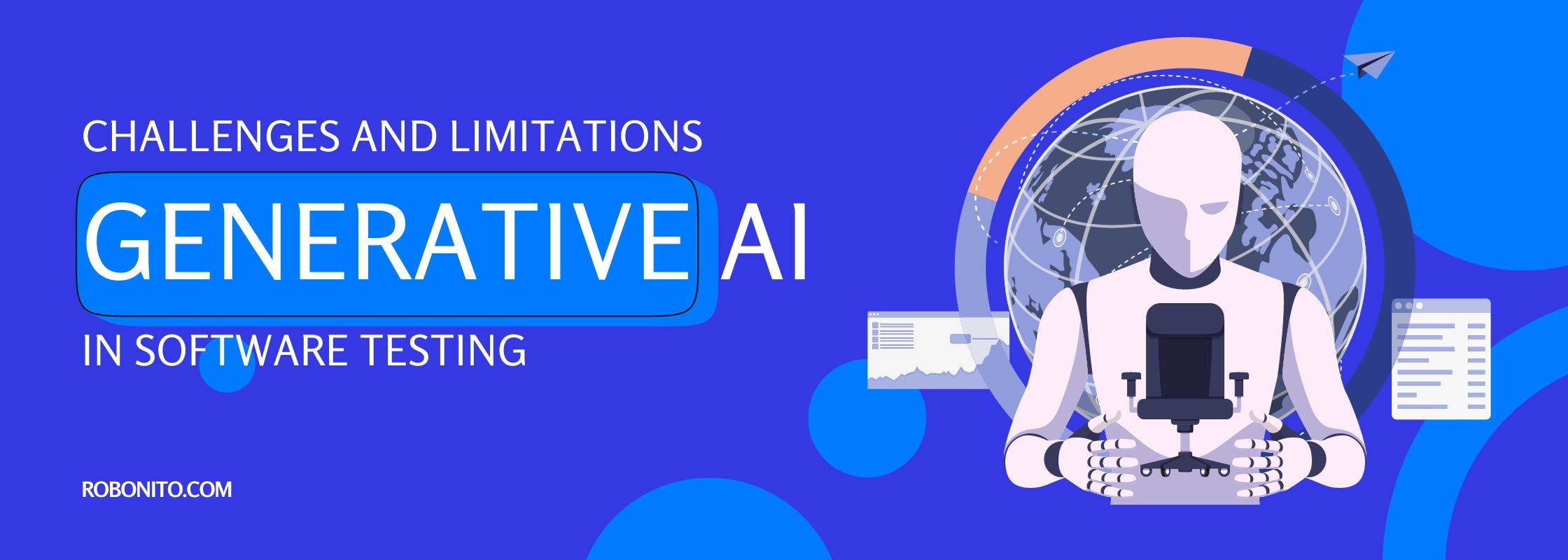
While generative AI brings numerous benefits, it also faces certain challenges and limitations. Some of these include:
-
Lack of Human Judgment: Generative AI algorithms may not possess human judgment and context, leading to potential false positives or false negatives in test results.
-
Domain Expertise: Understanding the intricacies of the software domain is crucial for effective generative AI testing. A lack of domain expertise may limit the accuracy and relevance of generated insights.
-
Data Availability: Generative AI algorithms require large volumes of high-quality data for effective training. Limited or insufficient data can hinder the performance and reliability of generative AI models.
-
Ethical Considerations: The use of generative AI in software testing raises ethical concerns, such as data privacy and bias. It is essential to address these issues and ensure responsible and ethical AI practices.
Challenges and Limitations of Generative AI in Software Testing
Description
Impact
Mitigation Strategies
Lack of Human Judgment
Generative AI algorithms may lack human judgment and context, potentially leading to false positives or false negatives in test results.
Increased risk of inaccurate test outcomes
Incorporating human oversight in the testing process to validate AI-generated results and refine algorithms.
Domain Expertise
Understanding the intricacies of the software domain is crucial for effective generative AI testing. A deficiency in domain expertise may limit the accuracy and relevance of generated insights.
Reduced accuracy in identifying complex software issues
Collaboration between AI experts and domain specialists to enhance AI's understanding of the software domain.
Data Availability
Generative AI algorithms require substantial volumes of high-quality data for effective training. Limited or insufficient data can impede the performance and reliability of generative AI models.
Decreased model performance and reliability
Employing data augmentation techniques, collaborating with multiple sources, or utilizing synthetic data generation to supplement limited datasets.
Ethical Considerations
The use of generative AI in software testing raises ethical concerns, including data privacy and bias. Addressing these issues is crucial to ensure responsible and ethical AI practices.
Potential privacy breaches and biased outcomes
Implementing robust data anonymization techniques, conducting regular bias audits, and adhering to ethical guidelines and regulations.
Resource Intensiveness
Generative AI testing often requires significant computational resources, leading to high infrastructure costs and time consumption.
Increased operational expenses and longer testing cycles
Optimizing algorithms for efficiency, utilizing cloud-based resources, and exploring distributed computing solutions to mitigate resource constraints.
Future Trends and Possibilities
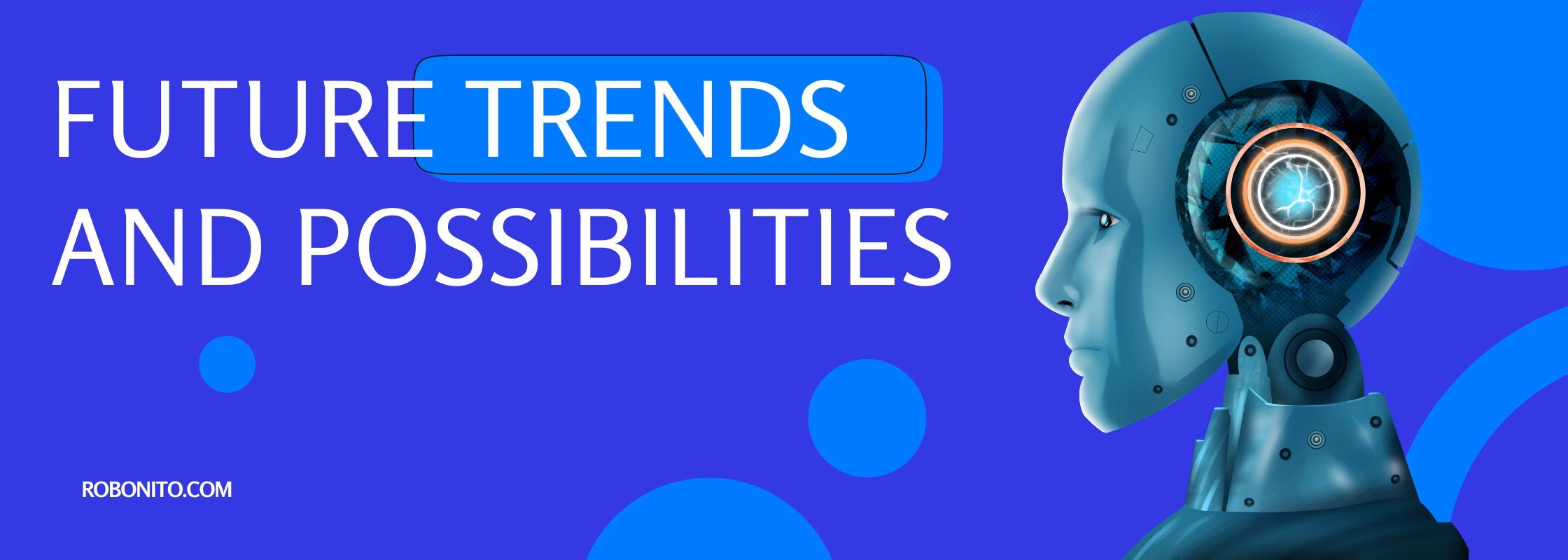
The future of generative AI in software testing holds immense potential. Here are some emerging trends and possibilities:
-
Intelligent Test Oracles: Generative AI can develop intelligent test oracles that dynamically adapt to changes in software requirements, improving the accuracy and effectiveness of test results.
-
Autonomous Test Suite Optimization: Generative AI algorithms can automatically optimize test suites based on changing software configurations and user requirements, reducing redundancy and improving efficiency.
-
Adaptive Test Case Generation: Generative AI can generate test cases that dynamically adapt to evolving software features and functionalities, ensuring continuous testing coverage and quality assurance.
-
AI-Driven Bug Triaging: Generative AI can assist in prioritizing and triaging bugs based on their severity, impact, and business priorities, helping developers allocate resources effectively.
A New No Code Automation Testing Tool Robonito Using Generative AI in Software Testing.
Conclusion
Generative AI has transformed the landscape of software testing by automating and optimizing various testing processes. From automated test case generation to bug detection and test data generation, generative AI brings efficiency, accuracy, and effectiveness to software testing. While challenges and limitations exist, the future of generative AI in software testing looks promising, with emerging trends and possibilities that can further enhance the quality and reliability of software applications.
Revolutionize your software testing with Robonito, the ultimate no-code RPA automation testing tool. Say goodbye to endless testing hours – Robonito slashes testing time by a staggering 98%! Ready to experience the future of software testing? BOOK A FREE DEMO NOW and transform your testing process today!
FAQs
1. Is generative AI replacing manual software testing? No, generative AI complements manual software testing by automating repetitive tasks and improving efficiency. Human judgment and expertise are still crucial in software testing.
2. Can generative AI detect all types of bugs? Generative AI can detect common bugs and vulnerabilities, but it may not identify complex or unique issues that require deep domain knowledge and human reasoning.
3. How does generative AI ensure the security of software applications? Generative AI analyzes code, network traffic, and user behavior to identify potential security vulnerabilities. It helps developers proactively address
4. What are the ethical considerations of using generative AI in software testing? Ethical considerations of using generative AI in software testing include ensuring data privacy, avoiding biases in the algorithms, and addressing potential social and legal implications of AI-generated testing results.
5. How can generative AI improve usability testing? Generative AI can improve usability testing by simulating user behavior and preferences, allowing for the identification of areas where user experience and interface design can be enhanced. This helps in creating software that is more intuitive and user-friendly.
6. Can generative AI be used for mobile app testing? Yes, generative AI can be used for mobile app testing. It can generate test cases specific to mobile platforms, simulate user interactions on mobile devices, and identify potential bugs or performance issues unique to mobile apps.
7. What are the limitations of generative AI in software testing? Some limitations of generative AI in software testing include the need for large volumes of high-quality data, the lack of human judgment and context, and the requirement for domain expertise to ensure accurate and relevant insights.
8. How can generative AI contribute to performance optimization? Generative AI can contribute to performance optimization by simulating various load conditions and identifying performance bottlenecks. This helps developers optimize their code, infrastructure, and system scalability to deliver high-performing software applications.
9. Can generative AI adapt to changes in software requirements? Generative AI can adapt to some changes in software requirements by dynamically adjusting test cases and scenarios. However, significant changes may still require human intervention for proper adaptation.
10. How does generative AI handle highly complex software architectures? Generative AI may face challenges in comprehending extremely intricate software architectures without sufficient domain expertise. Collaborative efforts between AI specialists and domain experts are crucial for handling such complexities.
11. What are the limitations of generative AI in understanding user-specific contexts? Generative AI algorithms might struggle to understand highly nuanced user-specific contexts, as these often require deep human understanding and empathy, areas where AI may fall short.
12. Can generative AI predict future software issues? While generative AI can anticipate certain patterns based on historical data, accurately predicting all future software issues remains a challenge due to the dynamic nature of software development.
13. Are there regulatory challenges related to using generative AI in software testing? Yes, compliance with various regulatory frameworks, especially regarding data privacy and security, poses challenges. It requires stringent measures to ensure AI-based testing adheres to legal requirements.
14. How does generative AI handle legacy systems in software testing? Generative AI may encounter difficulties with legacy systems due to outdated structures and lack of modern data formats. Specialized adaptations or pre-processing may be needed for effective testing.
15. Can generative AI ensure compatibility across diverse software environments? While generative AI aids in testing across different environments, ensuring complete compatibility demands understanding intricate nuances specific to each environment, which can be challenging.
16. Does generative AI assist in documentation and reporting of software testing outcomes? Generative AI can streamline documentation by automatically summarizing testing outcomes. However, human verification and contextualization are necessary for comprehensive and accurate reports.
